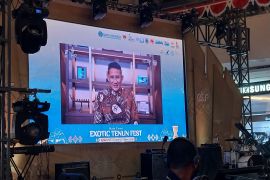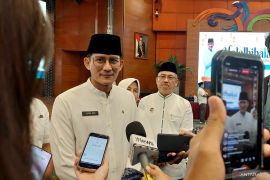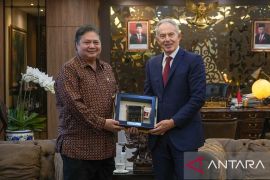The comments were made by Industry Minister Airlangga Hartarto during the National Woven Fabric Exhibition, held in the the industry ministry offices, here.
"Woven fabric is one of the creative industries that need to be promoted. Following the success of batik, woven products should be Indonesias seeded products, especially since every area in the country have their own particular characteristics seen in their woven fabric," said Hartarto in Jakarta on Tuesday.
For that reason, Hartarto encourage Small and Medium Enterprise (SME) craftsmen to maximize the use of natural resources, even those found in their own gardens or yards.
Not only should local products be used as supporting materials in making products, they can also be turned into core materials, such as cotton and natural coloring.
"We will be directing the craftsmen to independently supply core materials for their woven products," he noted.
The Exhibition, organized by the Industry Ministry in partnership with the National Crafts Board, was officially opened by the Boards chairman, Mufidah Jusuf Kalla.
The opening event was attended by Board members and ladies of the Working Cabinet Solidarity Organization.
Through this event, the Industry Ministry expressed their intention to focus on promoting the growth of woven fabric SMEs through various training sessions and by offering technical assistance, start-up machinery and tools, along with sharing marketing techniques.
"We also encourage craftsmen from the woven SMEs to take advantage of the Ministrys great hall to find the solution to production issues or seek assistance in increasing productivity through research and development activities," he noted.
There are two seeded textiles in Indonesia that are known worldwide, batik and woven (tenun).
"These products have exotic patterns that effortlessly catch peoples attention," said Hartarto.
Much like Batik, woven fabrics have significantly contributed to the performance of the nations fashion sector.
In 2015, Indonesias export value in the worlds fashion market reached US$7.28 billion.
"With the growth of technology in woven manufacturing, the opportunity for it to enter the international market rises, and we will take this opportunity to push the market forward," he continued.
He further explained that woven fabrics come in various colors, patterns and prints that are intertwined with the environment and beliefs, they also represent important parts of the culture and growing social values.
In terms of their function, woven fabrics are often turned into outfits for cultural ceremonies or used as dowries in wedding ceremonies. Also, it often represents the social status of its wearer.
The woven fabric industry is spread across Indonesia from Ulos Weave in North Sumatra, Troso Weave in Jepara, Central Java, Endek Weave in Bali, to Rote Weave in East Nusa.
"The creativity of the weave craftsmen who have been spread across the country has become a cultural uniqueness," Hartarto concluded. (*)
Editor: Heru Purwanto
Copyright © ANTARA 2016











